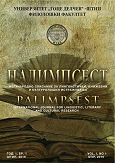CHATGPT USAGE: A LINGUIST’S PERSPECTIVE
DOI:
https://doi.org/10.46763/PALIM24917191rAbstract
The article discusses a popular computer program that simulates human conversation: ChatGPT. Chatbots with integrated natural language processing (NLP) can appear to understand questions and respond in a manner that seems knowledgeable. Developed similarly to computer-assisted translation tools, the developers moved from rule-based architecture to AI-supported tools using NLP and machine learning (ML) to power seemingly more intelligent conversations (e.g. Apple’s Siri, Google Assistant, Samsung’s Bixby and Amazon’s Alexa). ChatGPT, according to the common wisdom, stands out from other virtual assistants and has the potential to improve the way we interact with technology. Based on several queries conducted with ChatGPT to test its usefulness, we give an analysis of the results, which is followed by a discussion of the pros and cons of its use, with an emphasis on its usage in the educational context, in which students and teachers should be aware of the possibilities and limitations of LLMs.
Keywords: AI; ChatGPT; DeepL; LLM; machine learning; machine translation; SDL Trados.


